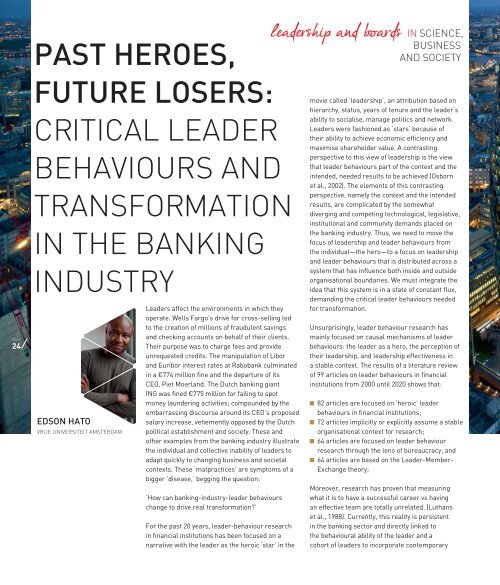Executives in Science, Business and Society 3
Create successful ePaper yourself
Turn your PDF publications into a flip-book with our unique Google optimized e-Paper software.
PAST HEROES,<br />
leadership <strong>and</strong> boards IN SCIENCE,<br />
BUSINESS<br />
AND SOCIETY<br />
PAGE<br />
24<br />
FUTURE LOSERS:<br />
CRITICAL LEADER<br />
BEHAVIOURS AND<br />
TRANSFORMATION<br />
IN THE BANKING<br />
INDUSTRY<br />
EDSON HATO<br />
VRIJE UNIVERSITEIT AMSTERDAM<br />
Leaders affect the environments <strong>in</strong> which they<br />
operate. Wells Fargo’s drive for cross-sell<strong>in</strong>g led<br />
to the creation of millions of fraudulent sav<strong>in</strong>gs<br />
<strong>and</strong> check<strong>in</strong>g accounts on behalf of their clients.<br />
Their purpose was to charge fees <strong>and</strong> provide<br />
unrequested credits. The manipulation of Libor<br />
<strong>and</strong> Euribor <strong>in</strong>terest rates at Rabobank culm<strong>in</strong>ated<br />
<strong>in</strong> a €774 million f<strong>in</strong>e <strong>and</strong> the departure of its<br />
CEO, Piet Moerl<strong>and</strong>. The Dutch bank<strong>in</strong>g giant<br />
ING was f<strong>in</strong>ed €775 million for fail<strong>in</strong>g to spot<br />
money launder<strong>in</strong>g activities; compounded by the<br />
embarrass<strong>in</strong>g discourse around its CEO’s proposed<br />
salary <strong>in</strong>crease, vehemently opposed by the Dutch<br />
political establishment <strong>and</strong> society. These <strong>and</strong><br />
other examples from the bank<strong>in</strong>g <strong>in</strong>dustry illustrate<br />
the <strong>in</strong>dividual <strong>and</strong> collective <strong>in</strong>ability of leaders to<br />
adapt quickly to chang<strong>in</strong>g bus<strong>in</strong>ess <strong>and</strong> societal<br />
contexts. These ‘malpractices’ are symptoms of a<br />
bigger ‘disease,’ begg<strong>in</strong>g the question:<br />
‘How can bank<strong>in</strong>g-<strong>in</strong>dustry-leader behaviours<br />
change to drive real transformation?’<br />
For the past 20 years, leader-behaviour research<br />
<strong>in</strong> f<strong>in</strong>ancial <strong>in</strong>stitutions has been focused on a<br />
narrative with the leader as the heroic ‘star’ <strong>in</strong> the<br />
movie called ‘leadership’, an attribution based on<br />
hierarchy, status, years of tenure <strong>and</strong> the leader’s<br />
ability to socialise, manage politics <strong>and</strong> network.<br />
Leaders were fashioned as ‘stars’ because of<br />
their ability to achieve economic efficiency <strong>and</strong><br />
maximise shareholder value. A contrast<strong>in</strong>g<br />
perspective to this view of leadership is the view<br />
that leader behaviours part of the context <strong>and</strong> the<br />
<strong>in</strong>tended, needed results to be achieved (Osborn<br />
et al., 2002). The elements of this contrast<strong>in</strong>g<br />
perspective, namely the context <strong>and</strong> the <strong>in</strong>tended<br />
results, are complicated by the somewhat<br />
diverg<strong>in</strong>g <strong>and</strong> compet<strong>in</strong>g technological, legislative,<br />
<strong>in</strong>stitutional <strong>and</strong> community dem<strong>and</strong>s placed on<br />
the bank<strong>in</strong>g <strong>in</strong>dustry. Thus, we need to move the<br />
focus of leadership <strong>and</strong> leader behaviours from<br />
the <strong>in</strong>dividual—the hero—to a focus on leadership<br />
<strong>and</strong> leader behaviours that is distributed across a<br />
system that has <strong>in</strong>fluence both <strong>in</strong>side <strong>and</strong> outside<br />
organisational boundaries. We must <strong>in</strong>tegrate the<br />
idea that this system is <strong>in</strong> a state of constant flux,<br />
dem<strong>and</strong><strong>in</strong>g the critical leader behaviours needed<br />
for transformation.<br />
Unsurpris<strong>in</strong>gly, leader behaviour research has<br />
ma<strong>in</strong>ly focused on causal mechanisms of leader<br />
behaviours: the leader as a hero, the perception of<br />
their leadership, <strong>and</strong> leadership effectiveness <strong>in</strong><br />
a stable context. The results of a literature review<br />
of 99 articles on leader behaviours <strong>in</strong> f<strong>in</strong>ancial<br />
<strong>in</strong>stitutions from 2000 until 2020 shows that:<br />
82 articles are focused on ‘heroic’ leader<br />
behaviours <strong>in</strong> f<strong>in</strong>ancial <strong>in</strong>stitutions;<br />
72 articles implicitly or explicitly assume a stable<br />
organisational context for research;<br />
64 articles are focused on leader behaviour<br />
research through the lens of bureaucracy; <strong>and</strong><br />
64 articles are based on the Leader-Member-<br />
Exchange theory;<br />
Moreover, research has proven that measur<strong>in</strong>g<br />
what it is to have a successful career vs hav<strong>in</strong>g<br />
an effective team are totally unrelated. (Luthans<br />
et al., 1988). Currently, this reality is persistent<br />
<strong>in</strong> the bank<strong>in</strong>g sector <strong>and</strong> directly l<strong>in</strong>ked to<br />
the behavioural ability of the leader <strong>and</strong> a<br />
cohort of leaders to <strong>in</strong>corporate contemporary

















